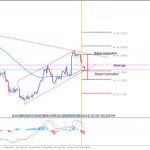A record monthly jump in prices drove British inflation to an eight-month high in December, piling pressure on the Bank of England to raise interest rates and show it is not letting inflation get out of control.
The Office for National Statistics said the annual rate of consumer price inflation rose to 3.7 percent from 3.3 in November – much higher than analysts’ forecasts for a steady reading, after prices rose a record one percent between November and December.
The pound shot up more than half a cent against the dollar to an eight week high, gilt futures dropped to a contract low and interest rate futures fell sharply as investors ramped up bets on when the BoE will start tightening policy.
Inflation has been at least a percentage point above the BoE’s two percent target throughout 2010, and rising inflation expectations among the general public and bond investors have caused markets to price in a first rate hike by mid-year.
Inflation is likely to climb yet higher in January, as an increase in value-add tax to 20 percent from 17.5 takes effect.
“The numbers are obviously a lot worse than expected. I think it does raise the risk that the Bank of England will have to move interest rates in the first half of this year,” said George Buckley, economist at Deutsche Bank.
The BoE forecast in November that inflation would average around 3.2 percent in the fourth quarter of 2010. More recently policymakers have said it could hit four percent early in 2011, due to January’s VAT rise.
The ONS said the biggest drivers of inflation at the end of the year were air transport, fuel, utility and food bills. Fuel costs rose at their fastest annual rate since July, and food prices showed their biggest annual rise since May 2009.
Oil prices are fast approaching $100 a barrel, far higher than the BoE assumed in its November Inflation Report.
But policymakers argue that the factors driving prices at the moment are temporary, and that raising interest rates in response risks derailing a fragile economic recovery.
The BoE had an estimate of the data when it made its decision to leave interest rates at their record low 0.5 percent in early January.
Credibility
Concern the Bank of England has lost its grip on inflation has risen to such a level that markets are increasingly pricing in an interest rate rise by the summer to prevent a full-blown credibility crisis.
“This raise is becoming much more difficult for the Bank of England; certainly there’s going to be a market expectation that they move much sooner rather than later,” said Ross Walker at RBS Financial Markets. “So I think you’ll start to see a May hike getting priced in quite soon.”
But Monetary Policy Committee member Paul Fisher said in an interview that although inflation was “very uncomfortable”, the BoE had made the right decisions on policy.
“We have to look through those short-term things, despite whatever unpopularity comes our way, to try and set the best policy rates for the medium term,” he told the Yorkshire Post.
The retail price inflation gauge, which includes more housing costs and is the benchmark for many wage deals picked up to 4.8 percent from 4.7 percent, in line with expectations, and the highest since July 2010.
With harsh public spending cuts about to bite, the government would probably be content for interest rates to remain at rock bottom levels.
But Prime Minister David Cameron did say he was concerned about price pressures “well outside what the Bank of England is meant to deliver.”














Leave A Comment